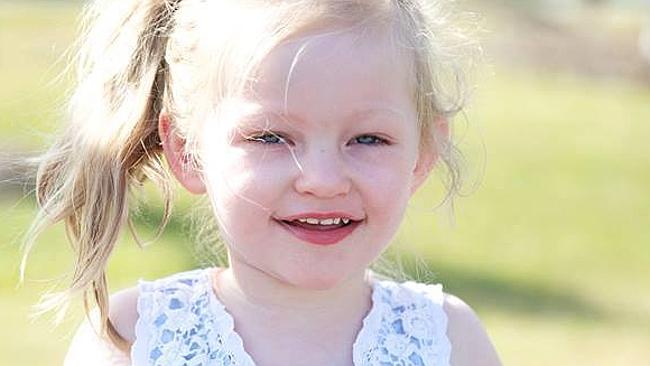
Chelsea has a rare genetic disorder called Aicardi syndrome. Source: Supplied
CHELSEA Hammel is four years old, but she cannot walk or talk, and has violent seizures when she’s startled out of sleep.
She takes 10 pills a day, hidden in yoghurt, and performs exercises to help her develop.
Chelsea, from Queensland, has a rare genetic disorder called Aicardi syndrome, which occurs almost exclusively in girls.
Her parents, Mel and Trent, have been warned not to expect her to live past her teenage years.

Mel and Trent Hammel with Chelsea, two-year-old Brock and three-month-old Tyler. Source: Supplied

Chelsea, four, uses a wheelchair, but is slowly learning to walk. Source: Supplied
“She usually has her seizures around sleep time,” Mrs Hammel told news.com.au. “Motorbikes or her brothers making noise can startle her and she’ll wake up having a seizure. She’ll also have them if she overheats.
“Sometimes she’ll have three in a day. Her arms jerk up and down, she’ll dribble and her jaw locks. She’s bit her lip, her tongue and her finger, and had ulcers in her cheeks.”
When Chelsea was two months old, her grandmother noticed that she kept twitching.
First-time mother Mrs Hammel took her little girl to the doctor and discovered these were infantile spasms. They realised Chelsea’s brain was not growing as it should, and she was diagnosed with cortical dysplasia and epilepsy.

She can stand for short periods of time with a walking frame or special boots. Source: Supplied

Chelsea and her mother spent her first Christmas in hospital. Source: Supplied
“It was overwhelming,” said Mrs Hammel, who stayed in the hospital with Chelsea for six weeks, for the little girl’s first Christmas and New Year.
“I left just once, on Christmas Eve, for a family dinner,” said Mrs Hammel. “I started bawling my eyes out, saying, ‘She should be here’.”
By the time Chelsea was 11 months old, she was diagnosed with cerebral palsy and Aicardi syndrome.
Now she uses a wheelchair and a walking frame, and has a winch to get her in and out of the bath. A monitor at night alerts her parents if she is having a seizure, at which point they can put her medicine in her cheek to put her to sleep.

The little girl has suffered serious injuries when she has seizures in her sleep. Source: Supplied

Her parents say they just want her to be happy and healthy. Source: Supplied
Chelsea practises walking with special boots every day, and has an “eye gaze” machine to help her communicate what she wants to her family. She can eat some foods with her hands.
While she will never talk, doctors have said she may one day walk.
“She’s like a nine-month-old,” said her mother. “She’s getting stronger. It’s a slow process but at least she’s not regressing. You have to be positive.
“She loves the water and anything that spins, like a fan. When we put the Wiggles on, she squeals with delight.”
But giving Chelsea the support she needs has not been cheap. Mr Hammel is a labourer, and the family “have a huge mortgage, like everyone else”.
Mrs Hammel worked out that her daughter’s special equipment, medication and nappies had cost $30,000 of their own money in one year.

Chelsea has special equipment for walking, playing and communicating. Source: Supplied

An “eye-gaze” machine helps her communicate without speech. Source: Supplied

Chelsea with her baby brother Tyler. Source: Supplied
That was when the mother-of-three “put her foot down” and began campaigning for respite to help the family build a home that was safe and accessible for Chelsea “so she can be included in family activities”.
Mrs Hammel is now helping to renovate the special education unit at the kindergarten Chelsea attends a few days a week, Mount Warren Park State School.
The family have got to know the community and become advocates in helping others in similar situations.
“If you’re not afraid to let people know and accept help, things can happen for you and your family,” said Mrs Hammel.
She and her husband have simple aspirations for their only daughter.
“Chelsea’s a beautiful little girl. We just want her to have a happy and healthy life, and to be able to communicate in her own way.”
To find out more about Chelsea, visit her Facebook page, or see her website Chance for Chelsea for more information about her condition or how to donate.

Chelsea takes 10 pills a day. Source: Supplied

The family organise fundraising events. Source: Supplied

The Hammels are determined to give Chelsea a normal life. Source: Supplied
Originally published as Tiny girl’s sleepy seizure battle
